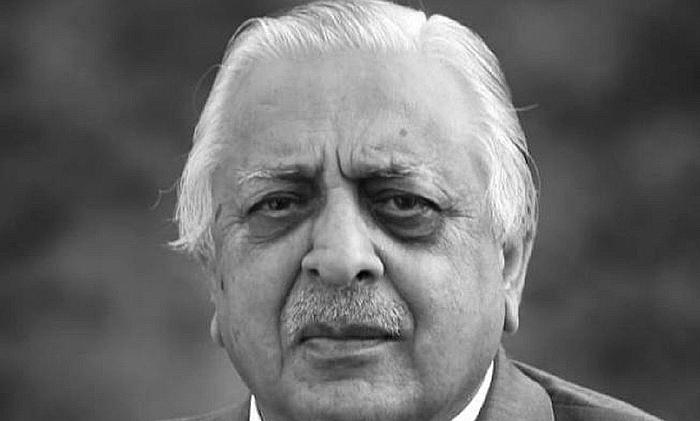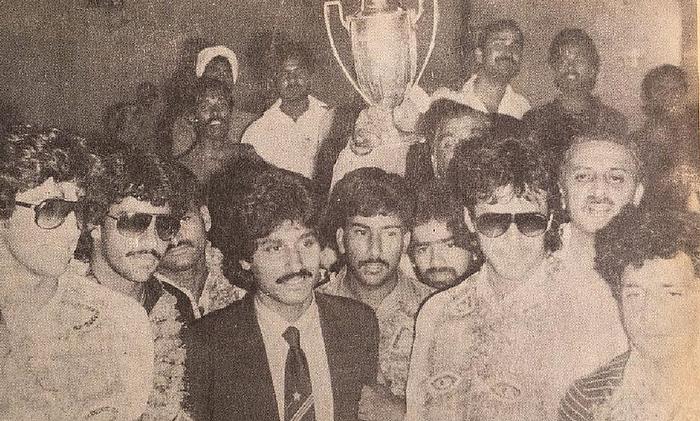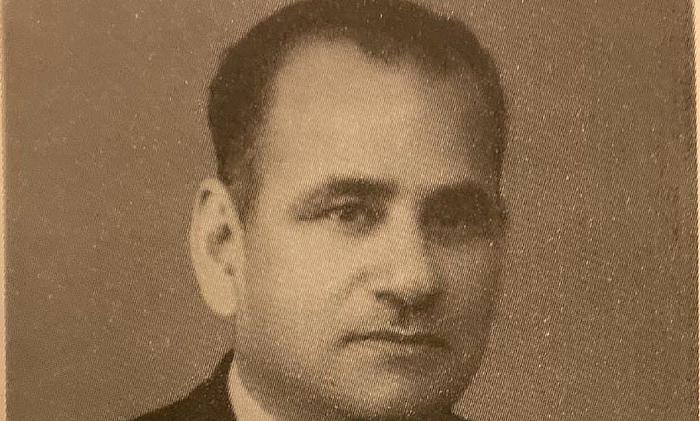Mohammad Ijaz Butt (1938-2023) - A Tribute

.jpeg.jpg)
.jpeg.jpg)
.jpeg.jpg)
.jpeg.jpg)
.jpeg.jpg)
.jpeg.jpg)

.jpeg.jpg)

.jpeg.jpg)
.jpeg.jpg)
.jpeg.jpg)
.jpeg.jpg)
Given he held the most prestigious sporting office in the country as Chairman of Pakistan Cricket Board, in perhaps its most challenging times (2008-11), it is inevitable Ijaz Butt’s legacy would be determined with the depressive events of the three-year period.
His passing away, following prolonged illness in Lahore on 3rd August, is an apt time to reflect on the life journey of one of the best-known cricket administrators in Pakistan. The jury is clearly out in the merits of his contribution to the game which he would go on to serve in a number of roles, for over a half a century.
His appointment as PCB Chairman, though political at the wishes of President of Pakistan Asif Zardari, chief patron of PCB, in October 2008, was welcomed by most for the reason that Butt was a former Test cricketer and with administrative and management experience both at regional and national level of the game. Only A.H. Kardar, of the previous chairmen could claim to have more suitable credentials. Butt sadly was unable to perform any miracles as the fortunes of the Pakistan cricket was on the down turn. The sequence of events was deeply frustrating as PCB stumbled from one crisis to another.
Kicking off with the issues of leading players signing to play Indian Cricket League (ICL), a terrorist attack on the Sri Lanka team coach, following blatant breach of security protocol, in Lahore in March 2009, followed by ICC decision to take away the hosting rights of international cricket in Pakistan, impacting both 2009 Champions Trophy and the 2011 World Cup. The financial implication of the two mega events being switched elsewhere was a crippling blow to PCB and Butt faced further criticism in agreeing to retain UAE as an alternative venue to play Pakistan’s home fixtures.
Pakistan in winning the 2009 T20 World Championship in England brought a rare moment of joy only for Butt to face yet another crisis when few months down the line captain Younis Khan walked out of the Pakistan team and all-rounder Shahid Afridi’s U-turn to quit Test cricket. The ‘icing on the cake’ was the shocking spot-fixing scandal at Lord’s in 2010 that saw Salman Butt, Mohammad Asif & Mohammad Amir, found guilty and banned from all cricket, bringing bad name to Pakistan cricket. It was tough times for Butt and the touring management, who it seems had failed to see it coming, despite being ‘close’ to Pakistan players. His unease in dealing with the core issues, saw him trying to ‘turn the tables’ on ECB by accusing the home players of wrong doing, after his arrival in England. That stance was both foolhardy and comical to say the least which failed to uplift the already tarnished image of Pakistan cricket at the global level.
And finally the ‘controversial’ semi-final defeat against India at Mohali in the 2011 World Cup and Butt’s public image was at an all-time low after a footage of him walking into Pakistan through Wagah border, portrayed him as a spent force, well past his prime in terms of physical and mental well-being. His stint was often marred with indecisiveness and reluctance to take tough decisions, a far cry from his early days. Butt refused to be diplomatic and was clearly in his comfort zone whilst being bold, outspoken and controversial, be it confronting standing committee, media or withstanding opposing factions, for that matter.
Admittedly there was a fair bit of bad luck in his three-year tenure (2008-11) as PCB Chairman, which he had accepted at the age of 70 but the challenges he confronted at national and international level tested the management knowhow of Butt and his trusted team of Yawar Saeed, Shafqat Rana, Intikhab Alam, Mohammad Ilyas, Wasim Bari & Waqar Younis – all former players. The overwhelming pressure from all around saw him rather snappy and irrational with an impression of the game having moved on at a pace he was not used it, particularly with his being away from the cricket affairs for considerable time. It is to be said though that even his critics, would not raise a finger on any financial corruption, throughout his association with the game with the cricket Board or LCCA. Moreover in sharp contrast to his predecessors, Butt was averse to seeking publicity, through friendly media.
Born in Sialkot (Punjab), British India, on March, 10, 1938, the youngest of the eight children of Mohammad Shafi Butt, who held a civilian role in MOD. The young Butt’s initial education was in Harcourt Butler School, Delhi and following partition of the sub-continent in 1947, would arrive in Rawalpindi. At St. Mary’s he took to wicket-keeping in the school team, led by Jamshed Burki and also included Javed Burki, with whom he would make first-class debut with their selection for Punjab Universities against the touring MCC ‘A’ a Bagh-e-Jinnah, Lahore in 1955-56. Butt had shown his batting potential with 97 in the second innings and another impressive 43 out of 100 all out when opening the batting with Jahangir Khan, a powerful Swat-born batsman, who was lost to the game in his youth, for Punjab at the Bohranwala Ground, Lyallpur (Faisalabad). Tall and lanky in his teens, Butt adopted a crouched stance, with posterior sticking out, to be given a name of ‘Ijaz Kubba’ in Liaqat Bagh, Rawalpindi – the hub of the game in the city, for both inter-school and club cricket.
Burki and Butt, formed a close friendship and in their days in Rawalpindi would rival each other when Pindi Club took on Pindi Sports, the club Butt represented since he was based in the old city. Burki was influential in seeing Butt’s move from Government College, Montgomery (now Sahiwal) to the more distinguished Government College, Lahore, at the time led by Haroon Khan, and he was a welcome inclusion as wicket-keeper batsman in the side. The ‘Pindi’ boys, also shared fond memories of their stay in hostel No.2 of Government College, Lahore.
Butt’s most memorable innings at domestic level with the bat was when he rose to the occasion with an outstanding 147 for Punjab against Karachi Whites at PU Ground, Lahore in the final of the 1956-57 Quaid-e-Azam Trophy. He was most impressive in handling the pace trio of Mahmood Hussain, Khan Mohammad and Mohammad Munaf. It was an era when most of the wicket-keepers in Pakistan would invariably be asked to open the innings. His career-best 161 (21 fours) was scored at Bagh-e-Jinnah Lahore, against the touring Indian Starlets, whilst sharing 166-run opening stand with Duncan Sharpe (55) for Pakistan Eaglets, for whom he would also undertake a tour of Ceylon and Malaya in 1960-61.
The initiative of Pakistan Sports Boards at the behest of skipper A.H. Kardar, would unearth four talented cricketers - Saeed Ahmed, Nasim-ul-Ghani, Ijaz Butt & Haseeb Ahsan - from a group of twenty University students, assembled at National Stadium, Karachi in the summer of 1957. It would represent a good investment for all four including Butt would win selection for next three overseas tours, undertaken by Pakistan. After sitting out amongst reserves in West Indies (1957-58) and India (1960-61), he finally found himself in the playing eleven against England at Birmingham in 1962, and more significantly, later in the series, replacing indisposed Imtiaz Ahmed, star wicket-keeper and opening batsman, who had not missed a Test for Pakistan since 1952.
Butt’s Test debut would come in a home series against West Indies in 1958-59, leaving a mark with the courage displayed at the batting crease, having become the first Pakistan batsman to suffer a serious injury at this level of the game. On the second afternoon, of the last ever Test to be staged at the picturesque Bagh-e-Jinnah Lahore the crowd witnessed Butt taking a blow on his nose from fiery paceman Wes Hall, before he had opened his account, whilst trying to hook. Eyewitness account confirms that shortly afterwards,
having been patched up by first aid team, he was seen standing up in the pavilion, quite eager to return to the crease. Pakistan team management opted for an overnight rest for him. Butt would resume batting at the fall of the fourth wicket and go on to top score with a brave unbeaten 47 in his side’s 209 all out. In the same year against the 1959-60 touring Australians, the 21-year-old Punjab University student, under strict instruction from skipper Fazal Mahmood who could ill-afford a fourth consecutive home defeat, to simply focus on crease occupation. In doing so, Butt took just over six hours to compile a snail-paced Test-best 58 against an attack featuring Lindwall, Davidson & Benaud. His efforts went a long way in Pakistan earning a draw.
Success alluded Pakistan on their 1962 tour of England and Butt, leaning on his experience of soft wickets with the 1956 Pakistan Eaglets, was one of six batsmen to reach the 1000- first-class run mark, with a hundred before lunch on the final day against Kent at Canterbury, giving him the most satisfaction, as he walked out with an unbeaten 129. At the conclusion of the tour, Pakistan cricket was engulfed in uncertainty, only to see some players including Butt to switch their attention to their careers. With very little international exchanges, Butt moved on to the phase where participation in Pakistan domestic cricket, was only possible when his employers allowed him to do so. He was asked to lead Multan, Lahore and also Lahore Reds, whom he captained in the 1967-68 Ayub Trophy , and it proved to be his last first-class outing.
Butt’s marriage to the daughter of Chaudhry Mohammad Hussain, opened the door for his proactive roles in cricket administration and management. His father-in-law, CEO of Servis Industries was close to the cricket affairs, following his successful working relationship with A.H. Kardar, with home he had toured Australia in 1973, with a view to promote sports footwear. Chaudhry Sahib had ensured that Servis was one of the first few banners to appear at the cricket grounds and when elected as President of Punjab Cricket Association, his proposal of Servis Cup – a limited-overs tournament – became part of the Board’s calendar and participated by all the top teams of domestic cricket.
Chaudhry Sahib took over the office when A.H. Kardar resigned as Chairman in 1977 and more often than not would ask Butt to gain experience of the role and deal with the day-to-day affairs of the cricket Board. One of Butt’s first challenges, besides the impact of Kerry Packer’s World Series Cricket on
Pakistan cricket, was to negotiate terms of cricket sponsorship put forward by Pakistan Tobacco Company (PTC), initially in the form of cash purse for Man of the Match and Series awards for the players. A novel concept in Pakistan cricket which Butt was more than happy to see being trialled, rather than viewing it as potential threat to Servis Industries. In doing so, he proved his business acumen, whilst gauging its long-term potential and feasibility of the proposal. His marketing instincts led him to form a healthy working relationship with Taher Memon of PTC , thus paving the way to see Wills brand grow and enjoy 21-years of unrivalled and fruitful partnership with the cricket Board. The two men also respected each other’s domain to ensure the smooth running the 1985-87 period when Memon served on the World Cup Directorate and Butt working as the secretary of the Board.
LCCA
Butt was thrice elected to preside over the affairs of newly formed Lahore City Cricket Association (LCCA) in 1978-87. The nine-year tenure was nothing but controversial for it was also the beginning of dirty politics in local cricket manifesting with registration of ‘bogus’ non-existent clubs in order to swing the election results in one’s favour and a number of other practices which were simply not cricket and a world apart from the highly dignified running in the previous decades by passionate and selfless cricket club Presidents with Syed Wazir Ali Summer League, being the showcase of Lahore cricket calendar.
Butt was fully aware that with Lahore being the leading nursery of Pakistan cricketers, his role demanded more visionary leadership as a ‘father figure’ to the cricket clubs in the city but found it hard going in order to create an amiable working relationship with the opposing camp. In this period Lahore cricket, as is the case now in all leading cricket centres in the country, it gave the impression of two power-hungry groups often losing sight of their prime objective, at the cost of the grassroots development.
The bitterness between a group headed by Butt with Hafiz Manzoor Hussain by his side against Aamer Rokri and Khalid Mahmood, triggered some unsavoury moments and it led to Shahbaz Sharif, who had friendship ties in both camps, chosen as an arbitrator. With both parties disputing election results, it was agreed that each group would be asked to run LCCA for 18months each, during a three-year cycle. Sadly even that written agreement was not honoured. At the height of the deadlock both groups showed disregard for any court rulings and insisted on sending their own
playing squad for fixtures of LCCA in domestic cricket, causing further squabbles between players, team officials and ground management. None of the stakeholders of Lahore cricket at the time, could look back to that period with any degree of pride.
In his sole appointment as manager of the Pakistan team, on a tour of Australia in 1981-82, he ended up on a ‘sticky wicket’ when the disappointment of Test defeats at Perth and Brisbane was compounded by the rift between Javed Miandad and Zaheer Abbas, captain and vice-captain respectively, that blew into the public domain. To his credit Butt was quite bold in bringing up the subject of neutral umpires and punishing tour schedule for Pakistan players, to the Australian media.
In 1985 whilst serving as the cricket Board secretary, his handling of the captaincy issue to see Javed Miandad step down and make way for Imran Khan’s return to the helm, deserves a mention. In the same role, he enthusiastically booked a chartered PIA flight from Lahore to Calcutta for the final of the 1987 World Cup, only to see Pakistan lose to unfancied Australia team in the semi-final at Lahore. Few weeks later he acted as peacekeeper, whilst serving as the Board secretary, in the infamous row between Test umpire Shakoor Rana and England captain Mike Gatting, during the Faisalabad Test. He was part of the national selection committee, on no less than seven occasions, in the period of 1976-88.
Butt was employed by Standard Vacuum Oil Co. before his joining Servis Industries, first in charge of factory in Gujrat and later appointed Marketing Director in the Head Office in Lahore. He excelled in innovation and business development with production of gas mask and syringes as two prime examples. He was President of Lahore Chamber of Commerce and Industry in 1997 and till confronted with health issues was a key member of its Council of Elders.
In his days as LCCA President, Butt also oversaw the growth of Servis CC , leading it to success in the city’s club cricket and a brief stay in Pakistan domestic cricket. Aftab Gul, Wasim Raja, Majid Usman, Aamer Hameed, Ramiz Raja, Afzal Masood and later Misbah-ul-Haq, were some of the name associated with the club. Later it had further two subsidiary clubs in Servis Colts and Gulberg Eaglets, with all three squads practising and playing their home fixtures at St. Mary’s school ground, in Gulberg, Lahore, not too far from Gaddafi Stadium.
An excellent host, Butt’s household in Lahore was known for lively animated debates over evening meals, often followed by a ‘competitive’ game of cards. His brother-in-law, Ahmad Mukhtar, served as Defence Minister of Pakistan (2008-12). Butt enjoyed travelling, was known for his well-groomed appearance and is survived by wife Najma, son and three daughters.
The scribe reached out to Javed Burki, Nasim-ul-Ghani, Majid Khan, Taher Memon, Saleem Altaf, Shafiq Ahmed ‘Papa’, Najum Latif, Khawaja Shuja-ud-din Butt, Sheikh Sarbuland & Taher Shah, for their valued contribution.




